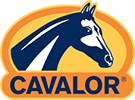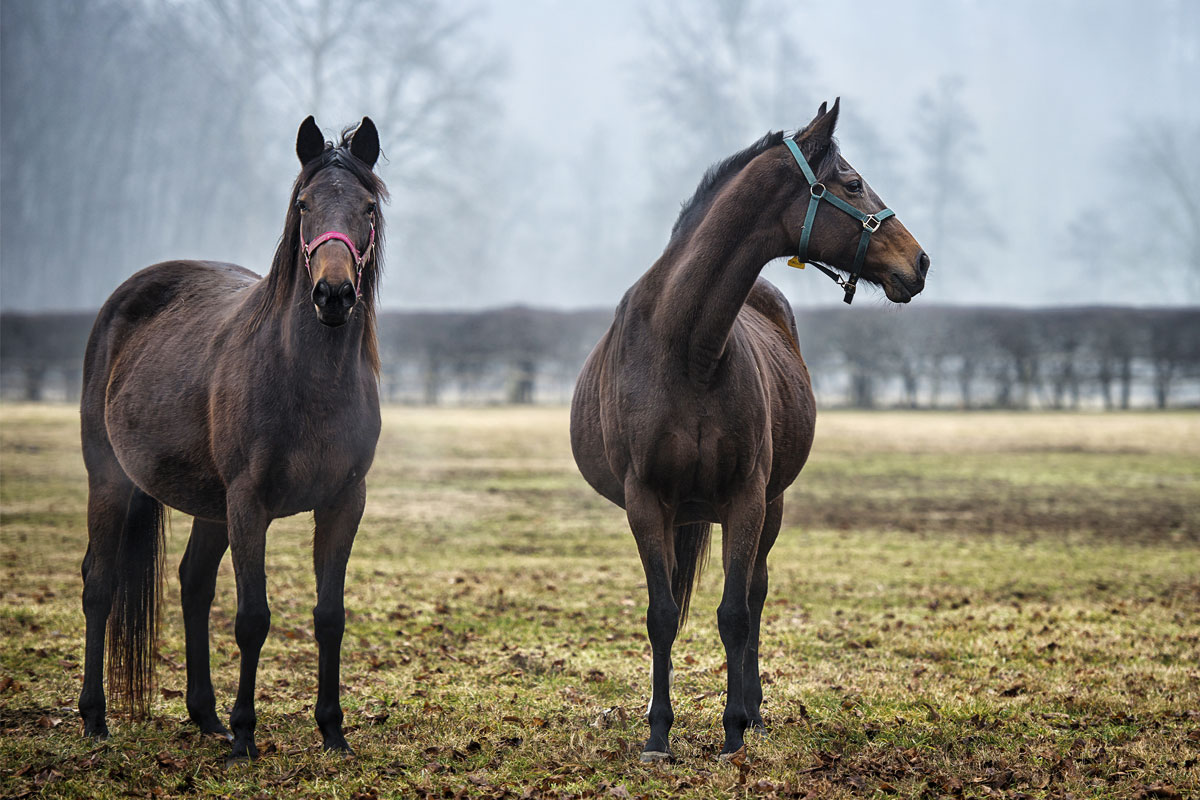Do sports and breeding go together? Many sport mares are used for breeding to pass on their genes, talents and qualities to their progeny. By embryo transplantation or by using the sport mare herself (once) as a broodmare. To return to competing afterwards. Both pregnancy and training demand a lot from horses, especially in combination. The gestation period is a time when a lot happens in the body of a mare. And rearing a foal requires a lot of energy. It is thus doubly important to have a clear picture of your mare’s needs.
The most important starting point for both sport and breeding is a horse in good health and at a healthy weight. Maintaining a healthy condition is paramount; you do not want your horse to become too heavy or too thin. A weight gain of 12% to 15% during pregnancy is normal and sufficient. The birth weight of the foal is, in fact, 10% of the weight of the mare before pregnancy. The basics for feeding a broodmare is the same as for a sport horse:
- Provide sufficient roughage and drinking water
- Feed as needed
- Divide concentrated feed over several smaller portions during the day
As a rule for roughage, we recommend a minimum of 1.5% of your horse’s weight in hay (2% for pre-dried). Your horse will then get enough dry feed. The amount of concentrated feed depends on the amount of energy, protein, vitamins and minerals in the roughage. During lactation, opt for concentrated feed high in energy and proteins to support milk production and recovery of the mare’s own body. And start this as early as the seventh month of pregnancy, because then the need for extra energy, protein and minerals will already begin to increase slightly. This need increases most from the time lactation starts. The mare needs extra water to produce milk. So always make sure there is enough drinking water.
The amount of concentrated feed depends on the amount of energy, protein, vitamins and minerals in the roughage
Top sport
Anyone who has ever experienced the delivery of a foal up close knows that this involves a lot of strength. The mare brings new life into the world with a great deal of effort. But the top sport actually only comes after birth. Raising a foal is quite demanding of the mother. The foal grows rapidly and is completely dependent on the mother’s milk production during the first six weeks. There is a great need for energy and proteins and the mare really does need to eat for two now. Not only does she have to provide enough milk, but she also has to help her own body recover.
This comparison shows how high the need is for energy, protein and minerals for a sport horse and a lactating mare:
| 600 KG | Sport horse (1 hour of moderate work) | Lactating mare (1st month) |
| EWpa (energy) | 6,9 g | 9,8 g |
| DCP (protein) | 525 g | 1115 g |
| Ca (calcium) | 56,70 g | 79,20 g |
| P (phosphorus) | 34,16 g | 48 g |
| Mg (magnesium) | 12 g | 12 g |
In comparison, you can express the need for proteins in DCP (digestible crude protein). For a sport horse that works an average of one hour a day, it is 525g. For a lactating mare with a newborn foal, it is at least 1115g. Digestible fibres and proteins are needed, among other things, for the production of milk. Does your mare spend more than eight hours a day in the pasture with her foal? She is then very likely to be able to get all her protein needs from the young spring grass (in April to May). Take this into account when calculating the amount of concentrated feed.
Back in shape
The foal’s birth went well, and the mare’s condition has been maintained during pregnancy and the following weeks. The mare looks fit, and you may want to start with (light) training again. It is good to realise that the mare’s body has undergone quite a few changes. The abdominal muscles have become longer, and under the influence of hormones, certain ligaments have become weaker. Such as those around the pelvis. All of this came about so that the foal could be born as easily as possible.
Six weeks after the birth of the foal, you can slowly start training again. The emphasis is on slow, allowing the mare to recover sufficiently from pregnancy and delivery so that she can optimally serve as a sport horse later on. Start with walking around and increase the time that the mare and the foal are apart. In the first few weeks of training, the schedule consists mainly of walking and trotting with the neck held low. There is no problem with galloping in between, as long as it is sufficiently alternated with stepping. Instructing the horse or possibly jumping only comes at a later stage, when the abdominal muscles are sufficiently strengthened to hold the weight. Allow at least eight weeks for your mare to get back some degree of fitness.
The mare already needed extra water, but after exertion, she will undoubtedly need some fluid so she can produce milk. So always make sure there is sufficient drinking water and, if she is sweating, add electrolytes.
Back to competing?
Of course, you eventually want to compete with your horse again. You have chosen to breed a foal with your sport horse. Give your mare time to do what you have asked of her: to raise a healthy and strong foal. Once the foal has been weaned, you can prioritise the competitions again. And bring the mare back to her original level.
Breeding is all about balance. Balance in selecting the mare and the stallion, balance in the mare’s body and balanced nutrition before, during and after having the foal. And, if you use your sport mare (temporarily) as a broodmare: the balance between breeding and training. Regardless of whether you are breeding with your sport mare or through a surrogate mare, the health of the mare is paramount.
Breeding is all about balance
If you decide to breed your sport horse mare: keep a close eye on her condition and give her time to get her old shape back. If you decide on an embryo transfer: be aware that the embryo flushing can affect your mare’s hormonal balance. A hormonal imbalance may in turn affect her athletic performance. So keep this in mind and try to maintain the right balance!
Keep a close watch on her condition and give her the time she needs to get back to her previous level of fitness. Happy and healthy horse, happy breeder (and rider)!
Nutritional advice from our nutritionists for your (brood)mare
Feeding a broodmare and her foal actually already started four months before the birth. From the seventh month of pregnancy, mares need additional nutrients to support the foal’s development and to prepare for producing milk at the end of pregnancy. Moreover, the mare can no longer sufficiently pass on certain trace elements, such as copper, after the eighth month of pregnancy. We thus recommend that you gradually switch to a concentrated feed high in energy and highly digestible protein, such as Cavalor Probreed mix or pellet, four months before birth.
Make sure that your horse always has access to sufficient and good quality roughage and drinking water. You will also continue to give the mare Cavalor Probreed (mix or pellet) during lactation. The need for extra energy, protein and minerals increases most during lactation. And you will have to increase the amount of concentrated feed. Is your mare in the pasture with her foal day and night with plenty of spring grass? Then she doesn’t need much extra concentrated feed. Once the foal is three months old, it can eat concentrated feed along with its mother. So don’t forget to replenish as needed.
Will you be starting training during lactation? Build up slowly. Does your horse sweat while riding? Immediately after riding, top up the water and add Cavalor Electrolyte Balance (powder) or Cavalor Electroliq Balance (liquid). This will help your horse recover optimally.
And finally: your mare and her foal are probably often in the pasture. Use Cavalor FlyLess or Cavalor ProScent to protect both against horseflies, flies, mosquitoes, ticks and other insects. That makes life a lot more pleasant!
Every horse is different. Every horse has different needs. Feed your horse as needed. Want to know more about an appropriate diet for your horse? Find out on www.MyCavalor.com or contact us via our Consumer line: +32(0)92202525.


